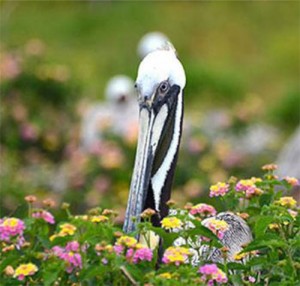On May 23, 2014, Warden Tim Wilkinson headed out with two boats and fourteen volunteers to count the nesting birds on Chester Island. It was a gorgeous day to be on the island! Biologist Brent Ortego, from Texas Parks & Wildlife, led the team during the count. Because of the shoreline erosion plus the failure of the pier on the east side of the island, the volunteer counters had to wade in from the boats.
The count this year was stupendous! While Chester Island continues to suffer from serious shoreline erosion in the year of 2014, its current 65-acre size supports an impressive total of 16,070 nesting pairs of all species of Colonial Waterbirds. The total count this year was greater by 2,850 nesting pairs (+22%)—compared to the 13,220 nesting pairs from the 2013 census. The island’s signature Brown Pelican seemed to be literally everywhere, with the total number of 3,274 nesting pairs similar to last year’s record number. The pelican chicks observed were of all ages—just hatched and fledglings alike. But the pelicans had to share space with an even greater number of nesting terns—mostly Royal and Sandwich Terns. The total number of all tern species jumped by an amazing +66% to 5,619 nesting pairs in 2014. Tricolored Herons also showed a solid +22% increase to 774 nesting pairs. Most other numbers held steady.
Species numbers go up and down from year to year. Even though census counters try to count at the same time of year and as accurately as possible, dramatic differences in the numbers may occur. These changes can be caused by quality and quantity of available habitat and available food, weather (here and elsewhere if the species is migratory), the presence of predators, or species site selection preference.
Juliet Lamb, a PhD candidate, has been working on a Brown Pelican tracking project to obtain baseline data on their movements in relation to offshore development in the Gulf of Mexico. Last year Juliet and her team tagged 10 Brown Pelicans from Chester Island with GPS backpack units—and at least two of those are believed to have returned to nest here again this year. However, others of the 10 tagged on Chester Island have decided to nest elsewhere this year— including Florida, Louisiana, and Galveston Bay. Apparently the individual Brown Pelicans have a mind of their own. Undoubtedly, we will learn much more about the interesting behavior of the Brown Pelican from Juliet’s research. Read more about her project here: https://sites.google.com/a/g.clemson.edu/jlamb/brown-pelican-tracking-project.
Thanks to all of the volunteers who helped make this census count a success!
Census takers:
• Tim Wilkinson, Audubon Coastal Warden of Chester Island
• Amanda Hackney and Vanessa Shanahan (Texas Audubon)
• Brent Ortego (Texas Parks & Wildlife and Coordinator of the Colonial Waterbird Surveys)
• Trey Barron (Texas Parks & Wildlife)
• Donna Anderson and Amber Miller (US Fish & Wildlife Services)
• Bill Ward and Steve Goertz (The Nature Conservancy)
• Volunteers: Lynn Travis, Peggy Wilkinson, Nancy Posey, Dora Ann Baass
• Brown Pelican Tracking Project members: Juliet Lamb and Yvan Svetge.
• Transportation to the island: Nancy Posey generously captained a boat to transfer one group of volunteers to the island. Tim Wilkinson, Warden, brought the other half of the group in Audubon boat, the Egret III.
The 2014 Census chart is at right. You may view census data comparisons (2014-2002) by visiting the website at http://www.chesterisland.org. To learn more about the Audubon’s Coastal Stewardship Program, please visit this site: http://tx.audubon.org/coastal-stewardship-program.
For more information about the island or to volunteer, you may contact the Chester Island Sanctuary Warden, Tim Wilkinson, by e-mail: twsword1@gmail.com.
2014 Chester Island Waterbird Census
Nesting Pairs by Species
May 23, 2014
Species ———Pairs
Brown Pelican 3,274
Neotropic Cormorant 27
Great Blue Heron 140
Great Egret 206
Snowy Egret 158
Little Blue Heron 16
Tricolored Heron 774
Reddish Egret 115
Cattle Egret 30
Black-crowned Night Heron 25
White Ibis 205
Roseate Spoonbill 262
Laughing Gull 5,200
Caspian Tern 19
Royal Tern 4,550
Sandwich Tern 1,050
Black Skimmer 19
Totals 16,070

